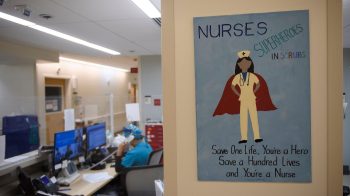Recession eases nursing gap, for now
TEXT OF STORY
KAI RYSSDAL: Turn on the television set, you’ll find two primetime shows dedicated to nurses. There are waiting lists across the country to get into nursing programs. Why all the RN buzz? You’ve probably heard the stories about hospitals with nursing shortages and how nursing’s a recession-proof job. As has been said many times, the rules in this recession are different.
Cathy Duchamp reports from Baltimore.
Cathy Duchamp: Nalani Narayan just graduated from the Johns Hopkins School of Nursing. In her last few months of hospital rounds, she witnessed the surge of experienced nurses coming back to work.
Nalani Narayan: They were taking up a lot of the hours. They’re willing to do overtime, they’re willing to work. I saw a nurse that would work six shifts, and when she wasn’t there, she was probably working somewhere else. It was amazing.
A lot of people go into nursing for security. That was part of the draw for 32-year-old Narayan. The former filmmaker was told Hopkins nursing grads often got hired, sight unseen. The reason: hospitals desperately need nurses. Now Narayan doubts there ever was a nursing shortage.
Narayan: I’m like “What shortage? I can’t get a job.” That’s really the case. I’d cry but I can’t. I just want to laugh about it.
There are still job openings for nurses. But vacancy rates nationwide are lower than they have been for years, says Peter Buerhaus. The Vanderbilt University professor is lead author on a recent study of the nursing labor market. He says in the last two years a record number of nurses have returned to full-time hospital work.
Peter Buerhaus: The numbers were absolutely beyond our comprehension.
Buerhaus says the reason experienced nurses are coming back has to do with family finances.
Buerhaus: Seventy percent of nurses are married. When their spouses either lose their jobs or are worried that they might, then some RNs who are not working decide, “Aha, I need to pop back into this labor market.” And others who already may be working, but say, part-time, they increase their hours of work.
That’s the story with Cynthia Yates. She’s been a nurse for 23 years. She’s trying to rebuild her family’s savings, in part because of her fiancee’s career.
Cynthia Yates: He’s in real estate. So one of us had to have a steady position.
Yates used to be a freelance nurse for the Greater Baltimore Medical Center. Better pay, more flexible hours than being on the hospital’s payroll. But last summer, her hours started to get cut, as staff nurses gobbled up the time. Yates says by fall, the situation got grim.
Yates: November, I got a total of 57 hours for the whole month. The economy has changed everything.
In March, Yates landed a permanent position in the hospital’s employee health department. She likes the steady paycheck and benefits. Hospital administrators admit the nursing shortage they’ve been harping about has eased. The danger, they say, is that it’s temporary.
Here’s Carmela Coyle. She leads the Maryland Hospital Administration.
Carmela Coyle: We know that we have a booming population, a sicker population and not enough nurses to take care of it.
Coyle is emphatic that those experienced nurses who have stepped up their hours will cut back or retire when the recession ends. That’s why hospitals nationwide continue to push nursing as a career.
Coyle: The desire to better coordinate care, the desire to treat the chronically ill in new and better ways, prevention and wellness. All of those things require more nurses than we have available today.
And that’s why Coyle says Maryland is the first state to launch a fund-raising campaign for $20 million to get new nurses in the pipeline.
In Baltimore, I’m Cathy Duchamp for Marketplace.
There’s a lot happening in the world. Through it all, Marketplace is here for you.
You rely on Marketplace to break down the world’s events and tell you how it affects you in a fact-based, approachable way. We rely on your financial support to keep making that possible.
Your donation today powers the independent journalism that you rely on. For just $5/month, you can help sustain Marketplace so we can keep reporting on the things that matter to you.


















